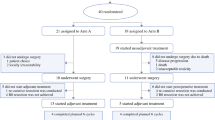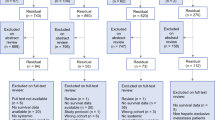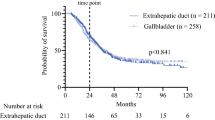Abstract
Background
In patients undergoing two-stage hepatectomy (TSH) for colorectal liver metastases (CRLM), chemotherapy is discontinued before portal vein occlusion and restarted after curative resection. Long chemotherapy-free intervals (CFI) may lead to tumor progression and poor oncological outcomes.
Objective
The aim of this study was to investigate the impact of the length of CFI on oncological outcome in patients undergoing TSH for CRLM.
Patients and Methods
Overall, 74 patients suffering from bilobar CRLM who underwent ALPPS (associating liver partition with portal vein ligation for staged hepatectomy; n = 43) or conventional TSH (n = 31) at two tertiary centers were investigated. The impact of CFI on long-term outcomes was analyzed by univariable and multivariable analysis.
Results
Preoperative chemotherapy was administered in 91 % (67/74) of patients, and chemotherapy was resumed postoperatively in 69 % (44/64) of patients who completed TSH. The use of postoperative chemotherapy was significantly associated with improved mean overall survival (36 ± 3 vs. 13 ± 3 months; p < 0.001). Overall, the median CFI from surgery to postoperative chemotherapy was 16 weeks (interquartile range 11–31) and was significantly shorter in the ALPPS group when compared with the conventional TSH group (10 vs. 21 weeks; p < 0.001). Multivariable analysis revealed a CFI ≤ 10 weeks as an independent factor associated with improved overall survival (p = 0.006) and disease-free survival (p = 0.010).
Conclusion
A short CFI is associated with improved oncological outcome in patients undergoing TSH for CRLM. Decreased interstage intervals after ALPPS may facilitate the timely resumption of chemotherapy.

Similar content being viewed by others
References
Nordlinger B, Sorbye H, Glimelius B, et al. Perioperative chemotherapy with FOLFOX4 and surgery versus surgery alone for resectable liver metastases from colorectal cancer (EORTC Intergroup trial 40983): a randomised controlled trial. Lancet. 2008;371(9617):1007-16.
Nordlinger B, Sorbye H, Glimelius B, et al. Perioperative FOLFOX4 chemotherapy and surgery versus surgery alone for resectable liver metastases from colorectal cancer (EORTC 40983): long-term results of a randomised, controlled, phase 3 trial. Lancet Oncol. 2013;14(12):1208-15.
Lehmann K, Rickenbacher A, Weber A, et al. Chemotherapy before liver resection of colorectal metastases: friend or foe? Ann Surg. 2012;255(2):237-47.
Adam R, Laurent A, Azoulay D, et al. Two-stage hepatectomy: a planned strategy to treat irresectable liver tumors. Ann Surg. 2000;232(6):777-85.
Clavien PA, Petrowsky H, DeOliveira ML, et al. Strategies for safer liver surgery and partial liver transplantation. N Engl J Med. 2007;356(15):1545-59.
Zorzi D, Laurent A, Pawlik TM, et al. Chemotherapy-associated hepatotoxicity and surgery for colorectal liver metastases. Br J Surg. 2007;94(3):274-86.
Brouquet A, Belghiti J. Chemotherapy and its effect on liver hypertrophy: implications for portal vein embolization and resection. Semin Intervent Radiol. 2008;25(2):162-7.
Malietzis G, Mughal A, Currie AC, et al. Factors implicated for delay of adjuvant chemotherapy in colorectal cancer: a meta-analysis of observational studies. Ann Surg Oncol. 2015;22(12):3793-802.
Des Guetz G, Nicolas P, Perret GY, et al. Does delaying adjuvant chemotherapy after curative surgery for colorectal cancer impair survival? A meta-analysis. Eur J Cancer. 2010;46(6):1049-55.
Brouquet A, Abdalla EK, Kopetz S, et al. High survival rate after two-stage resection of advanced colorectal liver metastases: response-based selection and complete resection define outcome. J Clin Oncol. 2011;29(8):1083-1090.
de Santibanes E, Clavien PA. Playing Play-Doh to prevent postoperative liver failure: the “ALPPS” approach. Ann Surg. 2012;255(3):415-7.
Schnitzbauer AA, Lang SA, Goessmann H, et al. Right portal vein ligation combined with in situ splitting induces rapid left lateral liver lobe hypertrophy enabling 2-staged extended right hepatic resection in small-for-size settings. Ann Surg. 2012;255(3):405-14.
Schadde E, Ardiles V, Slankamenac K, et al. ALPPS offers a better chance of complete resection in patients with primarily unresectable liver tumors compared with conventional-staged hepatectomies: results of a multicenter analysis. World J Surg. 2014;38(6):1510-9.
Berglund A, Cedermark B, Glimelius B. Is it deleterious to delay the start of adjuvant chemotherapy in colon cancer stage III? Ann Oncol. 2008;19(2):400-2.
Czaykowski PM, Gill S, Kennecke HF, et al. Adjuvant chemotherapy for stage III colon cancer: does timing matter? Dis Colon Rectum. 2011;54(9):1082-9.
Biagi JJ, Raphael MJ, Mackillop WJ, et al. Association between time to initiation of adjuvant chemotherapy and survival in colorectal cancer: a systematic review and meta-analysis. JAMA. 2011;305(22):2335-42.
Adam R, Pascal G, Castaing D, et al. Tumor progression while on chemotherapy: a contraindication to liver resection for multiple colorectal metastases? Ann Surg. 2004;240(6):1052-61; discussion 1061-4.
Allen PJ, Kemeny N, Jarnagin W, et al. Importance of response to neoadjuvant chemotherapy in patients undergoing resection of synchronous colorectal liver metastases. J Gastrointest Surg. 2003;7(1):109-15; discussion 116-7.
Adam R, Bhangui P, Poston G, et al. Is perioperative chemotherapy useful for solitary, metachronous, colorectal liver metastases? Ann Surg. 2010;252(5):774-87.
Spelt L, Sparrelid E, Isaksson B, et al. Tumour growth after portal vein embolization with pre-procedural chemotherapy for colorectal liver metastases. HPB (Oxford). 2015;17(6):529-535.
Wicherts DA, Miller R, de Haas RJ, et al. Long-term results of two-stage hepatectomy for irresectable colorectal cancer liver metastases. Ann Surg. 2008;248(6):994-1005.
Pamecha V, Nedjat-Shokouhi B, Gurusamy K, et al. Prospective evaluation of two-stage hepatectomy combined with selective portal vein embolisation and systemic chemotherapy for patients with unresectable bilobar colorectal liver metastases. Dig Surg. 2008;25(5):387-93.
Goere D, Farges O, Leporrier J, et al. Chemotherapy does not impair hypertrophy of the left liver after right portal vein obstruction. J Gastrointest Surg. 2006;10(3):365-70.
Beal IK, Anthony S, Papadopoulou A, et al. Portal vein embolisation prior to hepatic resection for colorectal liver metastases and the effects of periprocedure chemotherapy. Br J Radiol. 2006;79(942):473-8.
Oldhafer KJ, Donati M, Jenner RM, et al. ALPPS for patients with colorectal liver metastases: effective liver hypertrophy, but early tumor recurrence. World J Surg. 2014;38(6):1504-9.
Abdalla EK, Hicks ME, Vauthey JN. Portal vein embolization: rationale, technique and future prospects. Br J Surg. 2001;88(2):165-75.
Broering DC, Hillert C, Krupski G, et al. Portal vein embolization vs. portal vein ligation for induction of hypertrophy of the future liver remnant. J Gastrointest Surg. 2002;6(6):905-913.
Robles R, Marin C, Lopez-Conesa A, et al. Comparative study of right portal vein ligation versus embolisation for induction of hypertrophy in two-stage hepatectomy for multiple bilateral colorectal liver metastases. Eur J Surg Oncol. 2012;38(7):586-593.
Funding
Mickael Lesurtel is supported by a professorship Grant from the Swiss National Science Foundation (PP00P3_128475).
Author information
Authors and Affiliations
Corresponding author
Electronic supplementary material
Below is the link to the electronic supplementary material.
Rights and permissions
About this article
Cite this article
Kambakamba, P., Linecker, M., Alvarez, F.A. et al. Short Chemotherapy-Free Interval Improves Oncological Outcome in Patients Undergoing Two-Stage Hepatectomy for Colorectal Liver Metastases. Ann Surg Oncol 23, 3915–3923 (2016). https://doi.org/10.1245/s10434-016-5419-5
Received:
Published:
Issue Date:
DOI: https://doi.org/10.1245/s10434-016-5419-5




